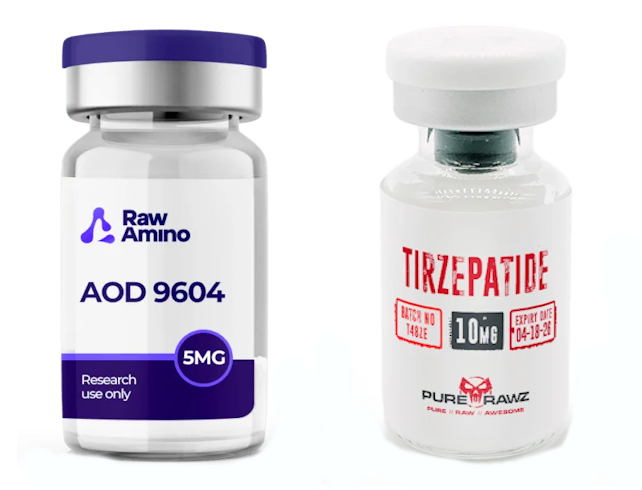In the realm of weight loss and metabolic health, peptide therapy has emerged as a powerful tool offering significant benefits over traditional weight loss treatments. Two standout options capturing attention in the world of medical science are AOD 9604 vs Tirzepatide. Both have demonstrated promise in clinical trials for improving fat metabolism, aiding weight loss, and enhancing overall metabolic function. However, their mechanisms, applications, and potential side effects differ, including factors such as affecting blood sugar levels shaping how individuals and healthcare providers choose the best weight loss solution for personalized treatment plans.
What is AOD 9604?

AOD 9604, often referred to as the “fat burning peptide,” is a modified fragment of human growth hormone (HGH). Unlike HGH treatments that broadly stimulate growth processes, AOD 9604 focuses specifically on fat metabolism. It comprises amino acids 176-191 of the HGH molecule, isolating the part responsible for fat burning while avoiding other systemic effects linked to elevated growth hormone levels.
Extensive research indicates that AOD 9604 peptide can accelerate weight loss by stimulating fat breakdown and preventing new fat accumulation. By targeting stubborn fat deposits and promoting the body’s natural ability to burn fat, it has become popular among those seeking an alternative to traditional weight loss medications.
Moreover, AOD 9604 plays a role in improving metabolic health, potentially benefiting blood sugar control, insulin resistance, and overall weight management. However, unlike some other peptide therapies, it does not significantly impact muscle mass or growth hormone levels, making it attractive for individuals concerned about preserving muscle mass and lean body composition.
What is Tirzepatide?
On the other side of the AOD 9604 vs Tirzepatide discussion stands tirzepatide—a cutting edge treatment hailed as an anti obesity drug with remarkable effects observed in clinical trials. Tirzepatide is a dual agonist, activating both the GLP-1 and GIP receptors, two hormones involved in appetite control, insulin secretion, and blood sugar regulation.
In randomized trials, patients receiving tirzepatide injections achieved significant weight loss, with some individuals losing over 20% of their body weight. Such results surpass many traditional weight loss medications and rival even surgical interventions. The drug not only assists in reducing appetite but also improves insulin sensitivity, stabilizes blood glucose levels, and supports long term weight management—key components of sustainable weight loss journeys.
Moreover, tirzepatide’s ability to enhance metabolic health extends beyond weight loss, potentially reducing risks linked to cardiovascular disease, fatty liver disease, and other obesity-related complications.
AOD 9604 Vs Tirzepatide Effects Compared
While both peptides aim to burn fat and promote fat loss, they operate through different biological pathways. AOD 9604 works directly on adipose (fat) tissue, enhancing fat metabolism and stimulating lipolysis—the process where fat cells release stored fat for energy. It primarily affects body fat without strongly influencing appetite or glucose metabolism.
In contrast, tirzepatide exerts a multifaceted approach, influencing hormones tied to satiety, blood sugar control, and energy balance. By mimicking incretin hormones, it slows gastric emptying, decreases food intake, and improves insulin resistance, creating a potent synergy for weight loss benefits and to improve metabolic health .
These distinct mechanisms mean that while AOD 9604 peptide is an excellent option for those aiming to target stubborn fat and refine body composition, tirzepatide offers broader metabolic benefits, particularly for individuals with insulin resistance or type 2 diabetes.
Clinical Trials and Weight Loss Outcomes
Numerous clinical trials have assessed both peptides, yielding compelling evidence:
- AOD 9604 trials indicate modest fat reduction, particularly in abdominal regions, supporting its reputation as a targeted fat burning peptide. However, the magnitude of weight loss is generally less dramatic than with newer weight loss medications.
- Tirzepatide trials consistently demonstrate substantial weight loss and improvements in cardiometabolic markers. One large study reported participants losing up to 22.5% of their body weight, significantly outperforming placebo groups and many existing traditional weight loss treatments.
These results illustrate why tirzepatide is being hailed as a potential game changer in weight management, especially for individuals struggling with obesity and metabolic diseases.
Administration and Personalized Treatment
Both peptides are administered via subcutaneous injection, typically performed under medical supervision after an initial consultation to determine if the treatment aligns with a patient’s health profile and health goals. Some individuals experience mild reactions at the injection site, such as redness or swelling, which usually resolve quickly.
When considering AOD 9604 vs Tirzepatide, healthcare providers often weigh several factors:
- AOD 9604 may suit those seeking a fat loss boost without major systemic effects or appetite suppression. It’s appealing for people close to their goal weight who want to improve body composition.
- Tirzepatide is favored for patients needing more intensive weight loss or those with metabolic conditions like type 2 diabetes. Its impact on blood sugar, insulin sensitivity, and reducing appetite makes it highly effective for comprehensive weight management.
Ultimately, personalized treatment plans are crucial. No single weight loss solution fits all. Patients should discuss options with qualified professionals to maximize results safely.
Potential Side Effects
While both peptides are generally well-tolerated, potential side effects exist:
- AOD 9604 side effects are minimal, primarily limited to injection site irritation or mild headaches.
- Tirzepatide may cause gastrointestinal issues like nausea, vomiting, diarrhea, or constipation, especially when doses increase. However, these symptoms often decrease as the body adjusts.
Patients must work closely with their healthcare providers to monitor progress and manage side effects effectively.
Frequently Asked Questions
Q: Is there anything better than tirzepatide for weight loss?
Currently, tirzepatide is one of the most effective weight-loss medications on the market, producing significant weight loss (often over 20% of body weight in clinical trials). It outperforms many other weight loss medications, including older GLP-1 agonists like semaglutide (Wegovy).
However, “better” can depend on individual factors like health conditions, cost, side effects, and treatment goals. For example:
- Bariatric surgery can yield even greater and longer-lasting weight loss than tirzepatide but involves invasive procedures and surgical risks.
- Combination peptide therapy (e.g., GLP-1 agonists with other metabolic agents) may become “better” in the future as research evolves.
- Lifestyle interventions remain crucial, even alongside tirzepatide, to maximize results and sustain long term weight management.
Overall, tirzepatide is currently at the cutting edge of anti obesity drug development, and few pharmacological options exceed its efficacy for weight loss.
Q: Does tirzepatide get rid of visceral fat?
Yes. Tirzepatide has been shown in clinical trials to significantly reduce visceral fat—the harmful fat stored around organs in the abdomen, which contributes to metabolic diseases like type 2 diabetes and cardiovascular disease, while also being influenced by human growth hormone levels .
Its mechanisms include:
- Reducing appetite and caloric intake
- Improving insulin sensitivity and glucose metabolism
- Promoting fat loss from both subcutaneous and visceral fat stores
This is one reason tirzepatide is viewed not only as a weight loss solution but also as a therapy to improve overall metabolic health.
Q: What peptide is similar to tirzepatide?
The peptide semaglutide (sold under brands like Wegovy and Ozempic) is the most similar to tirzepatide. Both:
- Belong to the incretin mimetic class
- Target GLP-1 receptors to suppress appetite, slow gastric emptying, and improve blood sugar control
- Promote substantial weight loss and metabolic benefits
However, tirzepatide is unique because it’s a dual agonist, stimulating both GLP-1 and GIP receptors, potentially enhancing weight loss benefits beyond semaglutide.
Other peptides being researched that may share similar effects include:
- Cagrilintide (an amylin analogue)
- Novel dual or triple agonists targeting GLP-1, GIP, and glucagon receptors
Yet as of now, semaglutide remains the most directly comparable peptide therapy to tirzepatide.
Q: How long does it take to lose weight on AOD 9604?
Weight loss with AOD 9604 tends to be gradual and modest compared to tirzepatide. Most individuals may begin seeing small changes in body fat within 4–12 weeks, especially when combined with a healthy diet and exercise.
Key points:
- Clinical trials show reductions in fat mass, particularly abdominal fat, over periods of 12–16 weeks.
- AOD 9604 isn’t as potent for large-scale weight reduction as newer drugs like tirzepatide but can help refine body composition and reduce stubborn fat.
- Its effects are more localized to fat burning without major changes in appetite or blood sugar control.
For substantial or significant weight loss, AOD 9604 (especially the nasal spray version) alone may not be sufficient for individuals with high amounts of excess weight. However, it can complement broader weight-loss programs as part of personalized treatment plans, enhancing the overall weight loss journey .
The Future of Peptide Therapy in Weight Loss
Modern medical science continues to revolutionize weight management through innovative peptides like AOD 9604 and tirzepatide. These treatments offer hope for those who have struggled with traditional weight loss treatments, enabling significant improvements in fat metabolism, body composition, metabolic health, and overall quality of life.
Whether you’re considering buying AOD 9604 peptide for its localized fat burning effects or exploring tirzepatide for comprehensive metabolic health support and significant weight loss, it’s crucial to seek professional guidance. Peptide therapy, combined with a healthy diet and lifestyle changes, can help many individuals finally achieve their goals to lose weight and unlock their body’s natural potential for sustainable health.
In the ongoing conversation of AOD 9604 vs Tirzepatide, one thing is certain: the future of weight loss and peptide therapy is brighter than ever.
